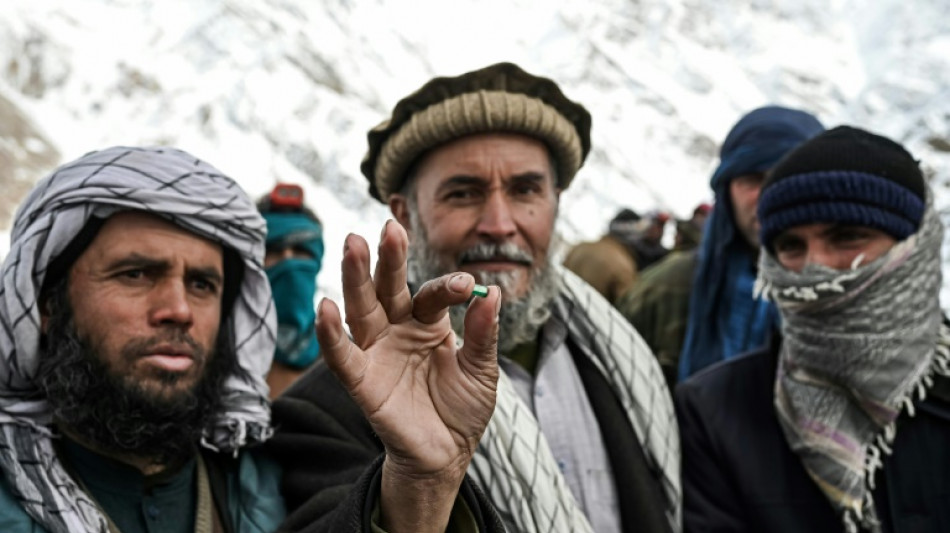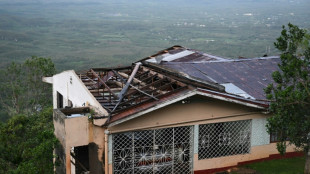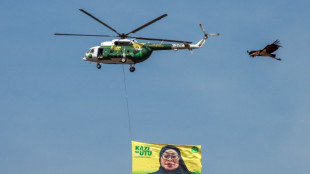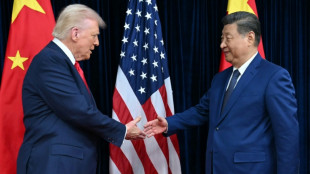
-
 'Nowhere to sleep': Melissa upends life for Jamaicans
'Nowhere to sleep': Melissa upends life for Jamaicans
-
Irish octogenarian enjoys new lease on life making harps

-
 Tanzania blackout after election chaos, deaths feared
Tanzania blackout after election chaos, deaths feared
-
G7 meets on countering China's critical mineral dominance

-
 Trump hails tariff, rare earth deal with Xi
Trump hails tariff, rare earth deal with Xi
-
Court rules against K-pop group NewJeans in label dispute

-
 India's Iyer says 'getting better by the day' after lacerated spleen
India's Iyer says 'getting better by the day' after lacerated spleen
-
Yesavage fairytale carries Blue Jays to World Series brink

-
 Bank of Japan keeps interest rates unchanged
Bank of Japan keeps interest rates unchanged
-
Impoverished Filipinos forge a life among the tombstones

-
 Jokic posts fourth straight triple-double as Nuggets rout Pelicans
Jokic posts fourth straight triple-double as Nuggets rout Pelicans
-
UN calls for end to Sudan siege after mass hospital killings

-
 Teenage Australian cricketer dies after being hit by ball
Teenage Australian cricketer dies after being hit by ball
-
As Russia advances on Kupiansk, Ukrainians fear second occupation

-
 Trade truce in balance as Trump meets 'tough negotiator' Xi
Trade truce in balance as Trump meets 'tough negotiator' Xi
-
China to send youngest astronaut, mice on space mission this week

-
 Yesavage gem carries Blue Jays to brink of World Series as Dodgers downed
Yesavage gem carries Blue Jays to brink of World Series as Dodgers downed
-
With inflation under control, ECB to hold rates steady again

-
 Asia stocks muted with all eyes on Trump-Xi meeting
Asia stocks muted with all eyes on Trump-Xi meeting
-
Personal tipping points: Four people share their climate journeys

-
 Moto3 rider Dettwiler 'no longer critical' after crash: family
Moto3 rider Dettwiler 'no longer critical' after crash: family
-
US economy in the dark as government shutdown cuts off crucial data

-
 Trump orders nuclear testing resumption ahead of Xi talks
Trump orders nuclear testing resumption ahead of Xi talks
-
'Utter madness': NZ farmers agree dairy sale to French group

-
 Samsung posts 32% profit rise on-year in third quarter
Samsung posts 32% profit rise on-year in third quarter
-
30 years after cliffhanger vote, Quebec separatists voice hope for independence

-
 Taxes, labor laws, pensions: what Milei wants to do next
Taxes, labor laws, pensions: what Milei wants to do next
-
South Sudan's blind football team dreams of Paralympic glory

-
 US says 4 killed in new strike on alleged Pacific drug boat
US says 4 killed in new strike on alleged Pacific drug boat
-
What we do and don't know about Rio's deadly police raid

-
 'They slit my son's throat' says mother of teen killed in Rio police raid
'They slit my son's throat' says mother of teen killed in Rio police raid
-
Arteta hails 'special' Dowman after 15-year-old makes historic Arsenal start

-
 Google parent Alphabet posts first $100 bn quarter as AI fuels growth
Google parent Alphabet posts first $100 bn quarter as AI fuels growth
-
Underwater 'human habitat' aims to allow researchers to make weeklong dives

-
 Maresca slams Delap for 'stupid' red card in Chelsea win at Wolves
Maresca slams Delap for 'stupid' red card in Chelsea win at Wolves
-
'Non-interventionist' Trump flexes muscles in Latin America

-
 Slot defends League Cup selection despite not meeting 'Liverpool standards'
Slot defends League Cup selection despite not meeting 'Liverpool standards'
-
'Poor' PSG retain Ligue 1 lead despite stalemate and Doue injury

-
 Kane nets twice in German Cup as Bayern set European wins record
Kane nets twice in German Cup as Bayern set European wins record
-
Liverpool crisis mounts after League Cup exit against Palace

-
 Juve bounce back after Tudor sacking as Roma, Inter keep pace with leaders Napoli
Juve bounce back after Tudor sacking as Roma, Inter keep pace with leaders Napoli
-
Kane scores twice as Bayern set European wins record

-
 Radio Free Asia suspends operations after Trump cuts and shutdown
Radio Free Asia suspends operations after Trump cuts and shutdown
-
Meta shares sink as $16 bn US tax charge tanks profit

-
 Dollar rises after Fed chair says December rate cut not a given
Dollar rises after Fed chair says December rate cut not a given
-
Google parent Alphabet posts first $100 bn quarter as AI drives growth

-
 Rob Jetten: ex-athlete setting the pace in Dutch politics
Rob Jetten: ex-athlete setting the pace in Dutch politics
-
Juve bounce back after Tudor sacking as Roma keep pace with leaders Napoli

-
 Favorite Sovereignty scratched from Breeders' Cup Classic after fever
Favorite Sovereignty scratched from Breeders' Cup Classic after fever
-
Doue injured as PSG held at Lorient in Ligue 1


Ex-government workers mine for salvation in Afghan mountains
In the bone-splitting chill of the Afghan mountains, Mohammad Israr Muradi digs through coarse earth spilling from the open mouth of an emerald mine.
With an improvised sieve and a few splashes of water, the former police officer scours a slag heap for fragments of the green gemstone, swarmed by dozens of others vying for the same prize.
Measured in a dusty open palm, the emerald pieces, pried from the bowels of the Mikeni Valley 130 kilometres (about 80 miles) northeast of Kabul, are no bigger than peanuts.
But they are just about enough to assuage total poverty in a nation mired in humanitarian catastrophe.
"The emeralds we find, we sell them for 50, 80, 100 or 150 Afghanis (between 50 cents and US$1.5)," Muradi said.
He was once head of the anti-terrorism police in neighbouring Paryan district.
Unemployed when the Taliban overran Kabul in mid-August, he initially tried his hand as a secondhand clothing salesman on the streets of the Afghan capital.
"It didn't work out," said the 25-year-old. Without any source of income, he was "forced" to head for the hills.
- Glimmer of hope -
Echoing booms roll across the valley, 3,000 metres above sea level, as blasting teams carve out shafts crisscrossing the innards of the mountains.
Locals have known about the presence of emeralds in Panjshir province for thousands of years.
Systematic mining only began in the 1970s and remains largely artisanal, but the gems found here are compared to Colombian emeralds, the most sought-after on the planet.
Each shaft is co-owned by several dozen partners and manned by a team of about 10 miners, digging lengths of more than 500 metres in search of glimmering veins of quartz.
But the last workers to arrive at the camp are relegated to the thankless, tedious and low-paid work at the mine entrances, where rickety trolleys tip out mounds of rubble.
It is a far cry from the decent job 27-year-old Gulabuddin Mohammadi previously had earning 35,000 Afghanis ($340) per month in the now defunct army.
The mines are a two-hour hike from the bottom of the valley up precarious paths of grimy ice, cresting at a mud hut village supplied by donkeys and powered by petrol generators.
But its far-flung location is part of the attraction for Mohammadi, a seven-year veteran who was looking for sanctuary when the army crumbled as US troops withdrew in August.
Many former soldiers and police officers have come here to eke out a living while evading potential reprisals for their roles in the previous Western-backed regime.
The Taliban have publicly proclaimed an amnesty, but human rights groups warn more than 100 people from those groups have been executed or "disappeared".
But for the moment, the squalor of the camp seems like the greatest injustice on Mohammadi's mind.
"We are treated like cattle," he sighed. "We have no real place to live, we are in tents. We have no water, no fire, no clinic if we get sick."
The withered Afghan economy means he has little choice of how else to feed his 25 family members.
Since their chaotic withdrawal, Western powers have frozen billions of dollars in overseas Afghan assets and aid, which propped up the country.
- Return to Kabul -
The mountainous redoubt of Panjshir has historically been a nest of resistance against outside forces.
The anti-Soviet mujahideen mustered here in the 1980s, and anti-Taliban forces rallied among the ridges when the hardline Islamists first ruled the country from 1996 to 2001.
But this time, the Mikeni Valley has not escaped the Taliban's touch.
The province was the last to fall in September, but when Taliban soldiers arrived there was little resistance.
Fighters travelled up to the mine a few days later, recalled Mohammad Riyah Nizami, a former senior Kabul police officer who worked there at the time.
They examined men's hands to identify newcomers with skin not yet roughened by mine work, and rounded up 20 who were later released.
"Nobody told them we were police, army or security services," said Nizami.
The Taliban, it turned out, were looking for fighters mobilising against their new government.
Nizami was lucky during his time at the mine. His job, secured through a friend, was to haul a cart through the mineshafts, a posting with a 400 Afghani (almost $4) daily salary.
Now he is back in Kabul, at the request of Taliban officials seeking his computer skills.
Muradi is ready to do the same.
The Taliban want to rebuild Afghanistan's army and police force.
For years, it was his task to chase them down. Now, he says, "If they call me back to work, I will go."
K.AbuDahab--SF-PST
